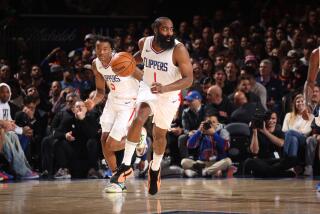Even With Ewing, Knicks Still Don’t Have the Talent
- Share via
From the end of last season to the start of the 1990-91 season that commenced Friday night in Charlotte, the New York Knicks have not made a move to acquire what they desperately need to compete for the NBA title. General Manager Al Bianchi scoffs at that notion, insisting that any club with Patrick Ewing can win 50 games and make a serious championship run.
Bianchi’s logic concerning Ewing is acceptable; Ewing alone can keep a team in contention on most nights. But Bianchi has taken the safe approach. Instead of looking at last season’s 45-37 group and deciding that at least one major deal was required for the Knicks to reach the summit, Bianchi’s posture was that with a few breaks, his team, as is, can do it.
Never mind that they still lack a reliable perimeter shooter that would keep defenses from collapsing around Ewing. In essence, Bianchi is gambling that his club has grown up. Considering that selfish play has torn down the Knicks the last two seasons, it’s a considerable gamble.
“You have to look at it like this,” Bianchi said. “We have the best center in the game. We were sideways from Day 1 last year (due to the ongoing Rod Strickland-Mark Jackson controversy that disrupted the team and both players) and (Charles) Oakley missed 28 games (because of a broken left hand). And we still won 45 games and got to the second round. That’s a pretty good team.”
But not good enough. The Knicks are one of the most selfish teams in the league. Several of their players look to score first, often at the expense of an open man with a better shot. There’s too much one-on-one play, and in general, this is a poor passing team.
Ewing notwithstanding, there is a shortage of big-time talent.
So what Bianchi has is a club of misfit specialists. Oakley is a rebounder. Gerald Wilkins’ specialty is the open-court game. Kenny Walker, when healthy, rebounds and plays tough defense. Mark Jackson and Maurice Cheeks run the club. Trent Tucker shoots the three-pointer. Kiki Vandeweghe, well, no one’s certain what he can do.
“It doesn’t matter who’s out there,” Ewing said. “We’ve got to get the job done.”
So far, these Knicks haven’t. Ewing, at 28, has probably three more seasons left in him at last year’s all-NBA level. Bianchi, working on a one-year contract, has less time to show improvement to his bosses.
“Now’s the hard part,” Bianchi said this week for the umpteenth time. “It was easy to go from 24 wins to making the playoffs and then winning 52 games. Now we have to take the next level.”
Bianchi has chosen to be patient, although it’s clear the Knicks need help if they are to reach that “next level.” There is some urgency, but Bianchi has taken the safe route, which could lead to a death trap -- for him and the team. Still, he’s doing it his way.
This is not to say that Bianchi won’t pull the trigger before the February trading deadline. He reminded the media this week that he brought in Oakley, Johnny Newman and Cheeks and “some of the big people.” To name names, he referred to Eddie Lee Wilkins and Stuart Gray. Weigh the Oakley deal and the Newman signing against the Cheeks-Strickland trade, the Gray deal for two second-round draft choices and the fact that he let Newman go to Charlotte for nothing, and determine Bianchi’s competence.
Bianchi knows talent but recently has appeared hesitant to make a deal to acquire it. “Trading is dead right now,” Bianchi said. “Everybody likes what they have -- until they really see it. After about a month or so, it’ll loosen up.”
(Optional add end)
By then, Bianchi will have loosened up as well. Most glaring is the hole the Knicks have at small forward, where Newman was always present to provide some relief, however inconsistent. Vandeweghe says he’s healthy but still rusty. Walker will miss at least the first five games with a knee strain, which means second-year player Brian Quinnett will back up Vandeweghe.
“Watch out for Brian,” Coach Stu Jackson said. “I think he can earn a living in this league as a defender.”
Defend? The Knicks need more offense than defense.
Rookie Jerrod Mustaf, while promising, is not often enough aggressive. “We’re monitoring that closely because rookies fall into that trap,” Jackson said.
And the trap that coaches fall into is high expectations. Jackson, in his second year, naturally seems more relaxed and in control. He believes that the Knicks are better now than they were last season, citing a rejuvenated Mark Jackson, a healthy Vandeweghe and overall familiarity with one another.
More to Read
Go beyond the scoreboard
Get the latest on L.A.'s teams in the daily Sports Report newsletter.
You may occasionally receive promotional content from the Los Angeles Times.










